 We wake up to the sound of an announcement from the mosque's loudspeaker. The staff at the hotel tell us that a man was shot and killed by the Israelis in Askar camp last night. Nablus is preparing to bury another martyr.
We wake up to the sound of an announcement from the mosque's loudspeaker. The staff at the hotel tell us that a man was shot and killed by the Israelis in Askar camp last night. Nablus is preparing to bury another martyr.After breakfast, we are visited by some students- A, Y and S- from An-Najah. They are members of Zajel, the university's youth exchange programme. They have kindly volunteered to take us round the old city today.
The old city is a maze of narrow alleyways and colourful bazaars. Its layout makes it an ideal hiding place for resistance fighters. During the 2002 siege, the Israelis were determined to forge a path into the area. The story of how they did so is horrific.
On 6 April 2002, a D9 Israeli army bulldozer destroyed the house of the Shu'bi family- over their heads. Eight members of this family were killed- including 3 children, their pregnant mother and their 85-year-old grandfather. Y narrates how their cries of 'we're still in here' went unheeded. Their neighbour, Ahmed Fu'ad al-Najjar, came out of his house and pleaded with the soldier to let the family leave the house first. The soldier responded by firing at al-Najjar. Today, the site of the massacre is marked by a plaque with the names of the family. Visit http://electronicintifada.net/v2/article1639.shtml for more details and a video.
Nablus is known for its Turkish baths, and we had the chance to visit one- one thousand years old! You can use a steam room, then receive a massage. There are separate days for men and women. Once you have had your bath, you can relax in the exquisitely decorated foyer. The Israelis did not even spare this historic place. However, the determined owner has single-handedly rebuilt the baths and they are functioning again today.
We make a brief stop to sample knafeh, a famed Nablusi sweet. If you are on a diet and wish to undo all your hard work, I invite you to sample this calorie-packed delicacy. It is cooked on huge platters- the bottom layer is cheese, which is topped with sugar-laden semolina. A few teaspoonfuls and you are full. Delicious.
As I said before, Nablus used to be the commercial centre of Palestine. One of its famous products was olive oil soap. We were taken to the site where an 800-year-old soap factory was decimated by F-16 bombers in 2002, to create another passage for the Israeli army into the old city.
The walls of old Nablus are pockmarked with innumerable bullet holes, bearing testimony to the terror the residents have lived through. There are posters of martyrs plastered everywhere. One which catches our eye is of 11-year-old Mahmoud Hamza Zaghloul, shot in his house on 30 September 2002. But he is only one of 952 Palestinian children that have been killed since the year 2000.
A recent martyr is Rami Shana'a, 25, a student at an-Najah. He was killed on 9 June 2007 while working in his family's butcher shop. He is the 56th student of the university to be martyred.
As we walk back to the hotel for a rest, we are overwhelmed by anger and despair. Nablus has lost 1000 people since 2000. And the killing continues. Do you ever hear about it on the news? I cannot help but think that a Palestinian life is deemed less worthy- and therefore less newsworthy- than an Israeli life. Let me give you one simple statistic. In 2006, 660 Palestinians were killed by Israeli 'security' forces. These included 141 children. The total number of Israelis killed by Palestinians in 2006? 23.
http://news.bbc.co.uk/1/hi/world/middle_east/6215769.stm
In the evening, we have a meeting with a Hamas MP. We are looking forward to hearing what she has to say, having met members of Fatah in Ramallah. She cannot receive us in her office- it has been burned down. (We visited it later). So we meet in a restaurant.
She starts the meeting with an apology- for being unable to introduce us to her colleagues. She reminds us that 46 Hamas MPs have been in Israeli prisons for months. This is a staggering fact- can you name any other country where 46 members of the government are in jail?
It is worth remembering that the 2006 elections in which Hamas came to power were witnessed by numerous international observers and were deemed to be free and fair. However, the election result was not to the West's liking. So the Palestinians were punished with sanctions imposed by the US and the EU, resulting in record levels of poverty and unemployment. The hypocrisy of the West is astounding- it is almost as if they are sending the message, 'You can have democracy- as long as it's the democracy we want'.
The excuse given by the West is that 'Hamas refuses to recognize Israel's right to exist'. I find it laughable that Israel, a country with the 4th biggest military and 11th highest standard of living in the world, is somehow dependent for its existence on recognition from a Palestinian political party (most of whose members are in jail or underground). We are constantly reminded by the Western media that Hamas' charter talks about the destruction of Israel, therefore they are evil. Has anybody noticed that Israel is actually destroying Palestine by continuing to kill and imprison its people and steal its land?
The logical thing for Israel and the West would have been to talk to Hamas. Even if they were the worst government in the world- which they were not, compared to the Arab regimes on America's payroll. Negotiations would have been the only possibility of making them give up their more odious demands. Remember that there was a time when the PLO didn't recognize Israel- until they were spoken to. And the IRA at one time promised an endless war against England.
But the boycott of Hamas continues; and now Israel and its allies are falling over each other to talk to Fatah, hailing the current government as the 'true representative of the Palestinian people'. This is amusing- before Hamas was elected, nobody was talking to Fatah!
The course Hamas took was far more pragmatic than anyone gives them credit for. After winning the election, they offered Israel a 10-year truce during which negotiations could take place. Israel declined. Hamas still observed a unilateral ceasefire. On February 13, 2005, Hamas leader Khaled Mashal declared that Hamas would stop armed struggle against Israel if Israel recognized the 1967 borders. The West and Israel responded by strangling the Palestinians with sanctions. So much for embracing democracy. On June 9 2006 Israel blew up 8 members of a family on a Gaza beach and Hamas ended its unilateral 16 month ceasefire.
We spend our last night in Nablus in the hotel, and are joined at dinner by the Manchester students we met in Ramallah. Their Scottish friend who is married to a man from Nablus comes as well. She and her husband normally live in the UK but are visiting his family at the moment. An Englishwoman working for a local NGO also pops in to say hello. And of course, Saed arrives for a chat.
It's been another upsetting day. Before I retire, I am reminded of the following quotes from the leaders of 'the only democracy in the Middle East':
"We must expel Arabs and take their places." -- David Ben Gurion, 1937; Ben Gurion and the Palestine Arabs, Oxford University Press, 1985. (Israeli PM)
"There is no such thing as a Palestinian people... It is not as if we came and threw them out and took their country. They didn't exist."-- Golda Meir; statement to The Sunday Times, 15 June 1969.
"[The Palestinians] are beasts walking on two legs."-- Israeli Prime Minister Menachem Begin, speech to the Knesset; quoted in Amnon Kapeliouk, "Begin and the 'Beasts,"' New Statesman, 25 June 1982.
"(The Palestinians) would be crushed like grasshoppers ... heads smashed against the boulders and walls."-- Israeli Prime Minister (at the time) Yitzhak Shamir in a speech to Jewish settlers; New York Times, 1 April 1988.
They have certainly proved true to their word.


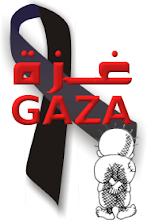
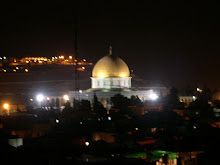
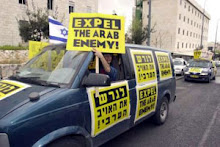




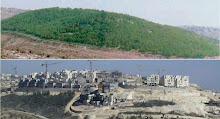



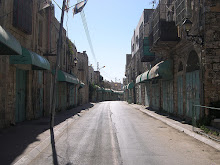
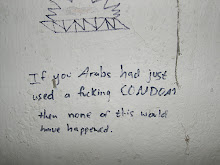
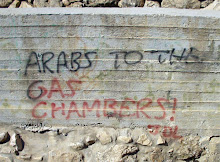

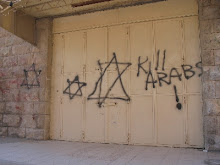
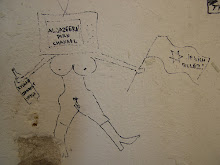
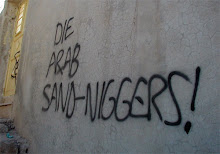
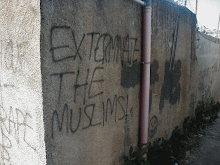
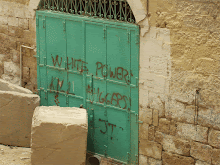



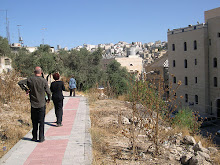

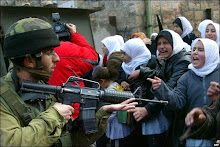
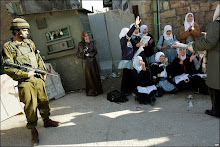
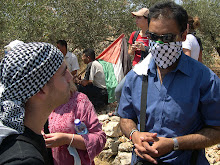
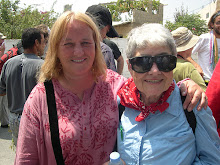
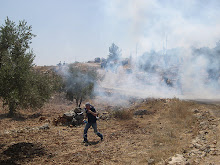
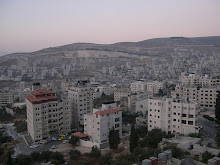

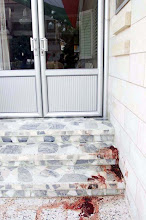








1 comment:
Thank you so much for such an honest blog - I reviewed it again today. I feel sick & angry, so off to see a Film about the "realities". When will the world wake up to the truth - what we are fed is just so distorted, or just plain non-existant. Thank you again - Salaam.
Post a Comment